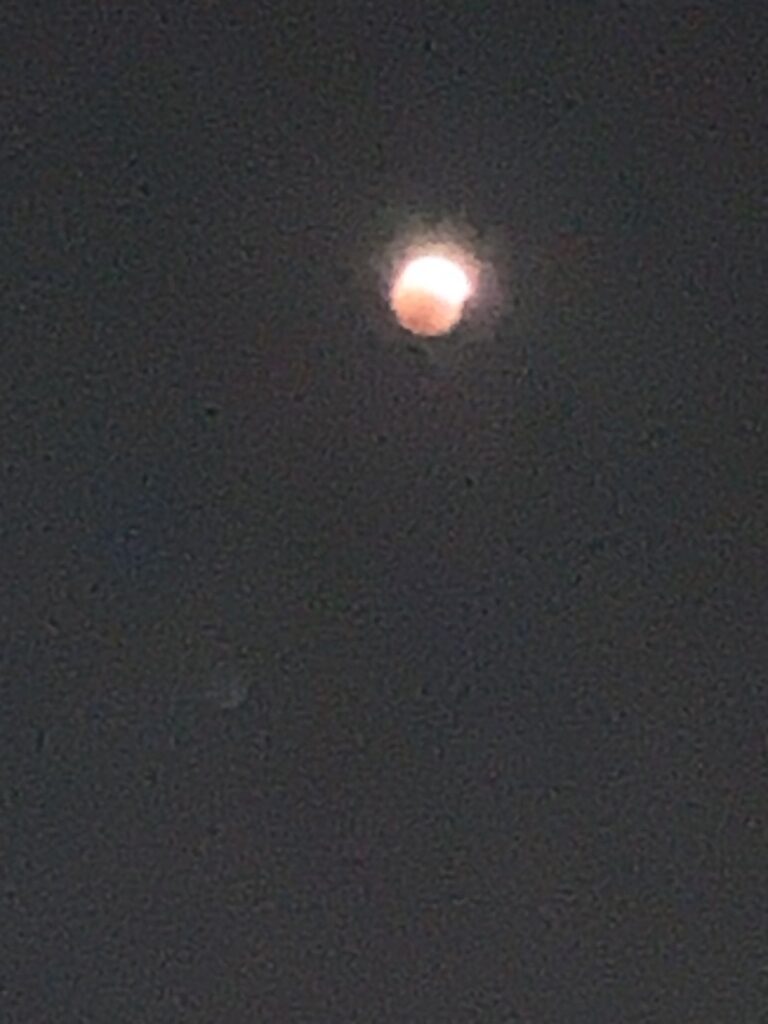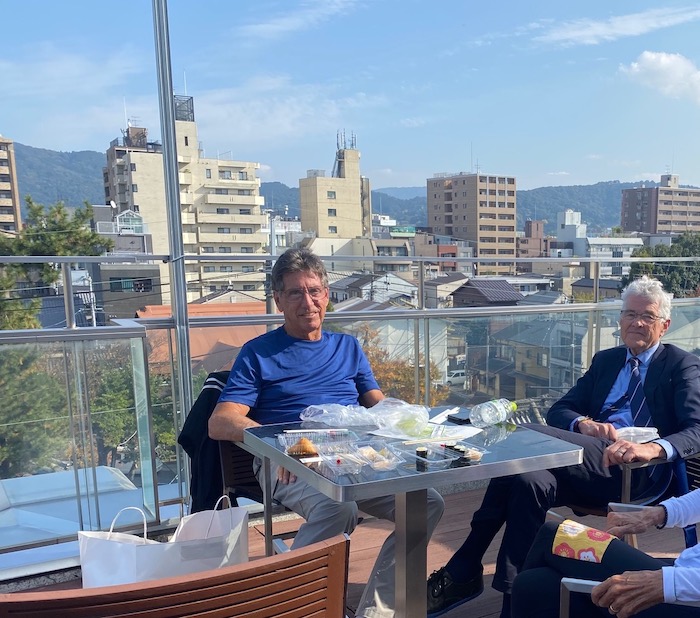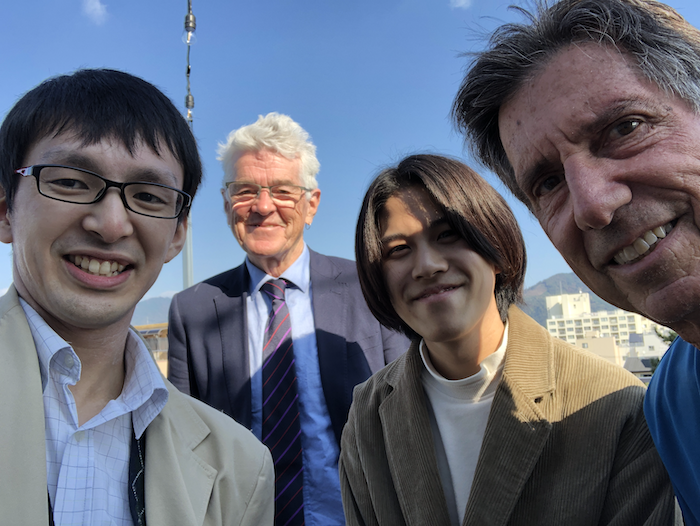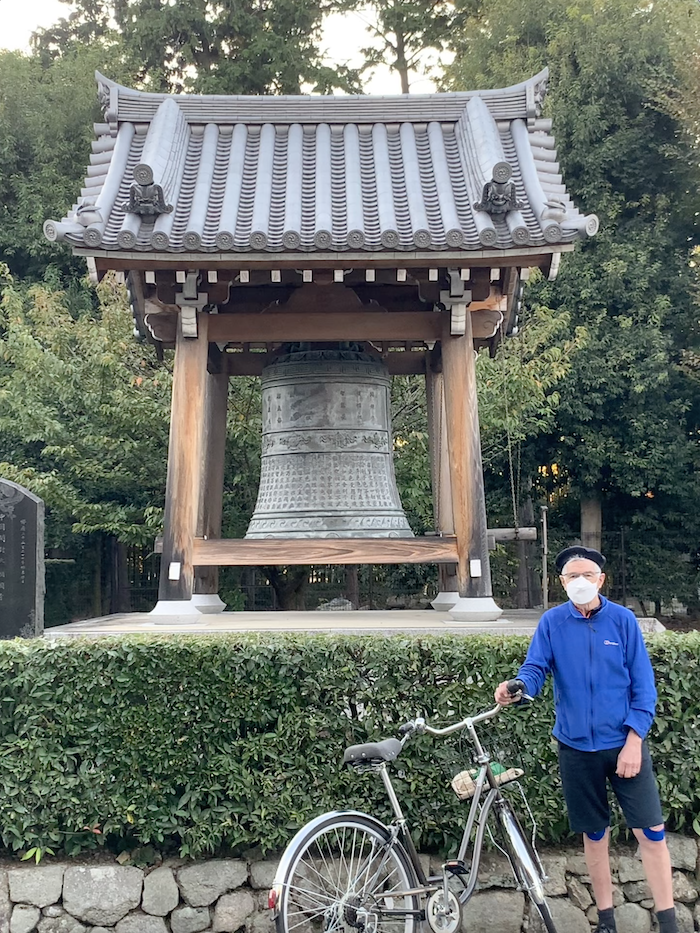Yesterday, the Bank of Japan increased its policy target rate for the first time in…
Kyoto Report No 6
This Tuesday report will provide some insights into life in Kyoto for a westerner in the age of Covid. Temples, visitors, grammar and more temples interrupted by a astronomic event. A week in Kyoto.
The last week has been work, work, work and not a lot else.
Lunar eclipse
However, there was a full lunar eclipse in the skies to the East of Kyoto above the mountain range that runs right down that flank of the city.
It was a beautifully clear night and so we were able to see the whole thing in the early evening.
It was very spectacular, especially once I learned that the total lunar eclipse was accompanied by a ‘lunar occultation of Uranus’ and the last time this was visible in Japan was 442 years ago (Source).
The people in 1580 certainly didn’t have iPhones to snap the event.
I did.
This is what I saw about 10 minutes before the full coverage.
Note: you can tell I am not a photographer. Point and press the iPhone is my approach.
There were several people out watching it in our neighbourhood in Kyoto and conversations were sparked by the occasion, which allowed me to practice my Japanese, such as it is.
It was a nice way to spend an hour after work.
Visitors from far off lands
In the same week, Warren Mosler and his partner were visiting us in Kyoto, the first time we had seen each other – besides Zoom calls – since the pandemic.
Normally (whatever that is these days) we managed to catch up at least once a year usually in Australia.
So for a few days last week my lunchtimes were taken up by a ride on my bike from my workplace to their hotel in Teramachi Dori (near the Imperial Gardens and Palace) where we had shared sandwiches on the outdoor roof terrace – a very Covid-safe environment.
We met with a few students (one from Tokyo and another local) to discuss MMT with them and generally had a nice time.
Then I pedalled back to work for the afternoon.
Here is our last lunch before they took off home to the US. Those beautiful hills to the East of Kyoto are my favourite place for riding bikes, walking, running and whatever else.
Warren seems to think he can turn up to work lunches in T-shirts! Americans!
This photo was taken minutes before we rang the US President instructing him to sack Jerome Powell for irresponsible management of the US Federal Reserve.
Only our call didn’t get through.
We wanted to though (-:
Here is the requisite selfie of our last meeting with the students.
Temples everywhere
There are over 2000 temples and shrines (Shinto and Buddhist) in Kyoto.
Some have beautiful gardens, such as the Enkō-ji Temple 圓光寺 in North-east Kyoto, which is my favourite.
At this time of year, the trees are a mass of different colours as Autumn progresses and each time you head out that way, the palette changes.
I hope to ride my bike out there again this coming weekend to see how the gardens have changed in hue.
Other temples and shrines have other characteristics – such as this one – Shokoku-ji complex – which is just north of the Imperial Palace and Gardens.
This complex “is the second of the Kyoto Gozan, the five leading Rinzai Zen temples in Kyoto during the medieval period.”
The temple “was built under the auspices of Shogun Ashikaga Yoshimitsu (1358-1408), with the Buddha Hall (Butsuden) completed in 1394”.
So pretty old.
It has been badly damaged at various periods by fire.
Here I am wondering whether I should abandon guitar and take up a musical career as a percussionist.
I was trying to work out the logistics of carting this bell to gigs!
Personal Pronouns in Japanese
Some interesting things to me about Japanese language usage.
I attended a very interesting seminar this week at Kyoto University which, among other things, discussed the role of language in reinforcing Japanese culture, in particular, its collectivism over individualism.
The – Japanese pronouns – are very different to the English personal pronouns.
In English there is ‘I’ and ‘You’ and they are considered invariant to context – that is, where you are, who you are talking to and other characteristics of the context.
In the Japanese language, your sense of ‘self’ is relative and situational and as a consequence they have different words for personal pronouns depending on the context.
It make it much harder to learn and avoid making faux pas when the hierarchy or degree of intimacy, which determines the relativity, is less than clear.
Thankfully, Japanese people are so stoked that foreigners like me take the time to try to learn their language that they are very forgiving and helpful.
Overtime, one starts to get a feel for the right personal pronoun to deploy in the various situations one encounters.
As I battle with that problem, my Kanji count slowly increases and I am learning more radicals at the moment.
The unfathomable on first blush, slowly starts to make sense.
Soon, though I have to go back to Australia until I return to Japan in 2023.
That is enough for today!
(c) Copyright 2022 William Mitchell. All Rights Reserved.




Loving the updates Bill!
Haha.. I think you should also consider comedy.
It’s kind of sad to hear it coming to the end; looks and sounds fun.
Speaking of the moon. You reminded me that Japan has megalithic structures (not that I have been – this isn’t a request either haha) Just reminded me of there astronomical significance in past times.
Nothing beats the sensation of travelling in the night sky.
Except maybe the music one plays and hears to crystallise those amazing moments…
At my large organisation today they ran an “economics for non economists” seminar. One of the very first things the economist said was that, like households, governments must live within their means. I nearly had a stroke but everyone else seemed to appreciate these insights.
Dear Bill,
Great to read that you are in town. I am a big fan of your work, have been for years !
I’ve lived in Kyoto for 3 years now, in the Eastern part of it, close to Kyodai and I love it here.
Will you be giving talks or conferences open to the general public by any chance ?
Thank you !
K.
So Bill, to use the contemporary lexicon, what are your pronouns? ; )
Mine is (or was, because it’s been a while!) “watashi”, which might be a bit polite, or even girly, but “boku” seems a bit laddish for someone who is the same age as yourself, and my teacher looked somewhat bemused when I once did.
Do you use watashi, boku, or something else? I’d be curious to know!
It would quite fun to try out “chin”, which traditionally was only ever used by the Emperor, though he reverted to watashi after WWll apparently.
Best, Mr S.
Dear Mr Shigemtisu (at 2022/11/16 at 8:03 pm)
The point is that there is no ‘one’ personal pronoun that you use in all situations.
There are many and they depend on the person using them, the situation you are in, the level of formality that is required given the age/gender etc, and the age of the person speaking.
In Kyoto, there is a distinct dialect that I am picking up which has particular usage.
So in English we say ‘I’. In Japanese, it all depends, which makes learning the language properly quite challenging but also interesting.
See the list at https://en.wikipedia.org/wiki/Japanese_pronouns.
Here is the known first personal pronouns and their context:
watashi – formal/informal
watakushi – very formal
ware – very formal
waga – ery formal
ore – informal males
boku – formal/informal males
washi – formal/informal mainly males – very prominent in Kansai dialect (Kyoto and around here)
jibun – formal/informal mainly males – Kansai dialect (Kyoto and around here)
atai – very informal females
atashi – informal females
atakushi – informal females
uchi – informal mostly females – especially the Kansai dialect.
oira – informal males – rednecks use this.
ora – informal
wate – informal all – old Kansai dialect
shōsei – formal, written males – among academic colleagues.
You will have to do some catching up!
All the best
bill
Dear Kris Len (at 2022/11/16 at 1:07 am)
Yes, you are living in a great area in Kyoto – the east to north east are the best neighbourhoods.
I live just near the Main Yoshida campus of Kyoto University close to the Kamo River off Konoe Dori. It is a really nice neighbourhood and the locals are very friendly.
I am not giving any public presentations this time around. It is just a work trip with researchers and university colleagues – the daily grind sort of trip with no bright lights (-:
all the best
bill
Hi Bill,
Thank you for your response. Yes I did read the link to all the pronouns in your original article – but what I was actually curious about is which particular ones *you* commonly find yourself using? Eg “Boku” wa… (?) with your band? Work colleagues? “Watashi” wa… in a shop/restaurant? And what for visiting VIPs etc (Is “watakushi” a bit over-formal or archaic?)
Sorry, it’s prob a bit too much to ask of a busy person!
I went to Japan before I studied the language, so don’t have any experience of using it in the field so to speak, hence my curiosity regarding your experiences, and my question.
Anyway, I follow your adventures, personal and linguistic, with interest, please keep it coming!
Best, Mr S